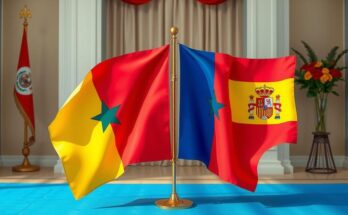Ecuador’s President Daniel Noboa has raised allegations of irregularities following the first-round presidential election, claiming armed groups pressured voters. Both he and opponent Luisa González have expressed doubts about the election’s integrity, yet international observers, including the OAS and the EU, dispute these claims, labeling the election as fair and transparent. The situation underscores a serious decline in democratic norms amid rising violence linked to drug cartels.
Ecuador’s President Daniel Noboa expressed concerns regarding the integrity of the first-round presidential election results, alleging irregularities after securing a narrow lead against leftist rival Luisa González. In a recent interview, he stated, “There have been many irregularities…we kept checking in certain provinces that there were things that didn’t add up.” Noboa also suggested that armed groups coerced voters to back González, raising further questions about the electoral process.
In contrast, the Organization of American States (OAS), which monitored the election, quickly refuted Noboa’s claims. They confirmed that the results from the National Electoral Council aligned with their quick count. The OAS stated, “we have neither identified nor received any indication of widespread irregularities that could alter the election results.” Following Noboa’s comments, Ecuador’s electoral authority reaffirmed its commitment to fair elections.
González also aired grievances over the election results, asserting there were “inconsistencies” in her interview with Teleamazonas, although she did not provide evidence. Meanwhile, the European Union’s observation mission deemed the election “transparent, well-organized, and peaceful,” dismissing claims of fraud and highlighting the surge of disinformation experienced during the campaign.
Jean Paul Pinto, a security analyst, warned that questions over electoral honesty signal a troubling decline in democratic norms in Ecuador. Pinto noted that Noboa’s governance style is reminiscent of the private sector, centralized through decrees, and emphasized the gravity of the president’s assertions regarding armed groups encroaching on the voting process. Complaints from both candidates reflect a growing concern over electoral legitimacy amid significant violence linked to drug cartels.
The nation has seen a staggering rise in violence, particularly along the coast, which has impacted election dynamics. Pinto observed that many voters support González as a rejection of Noboa rather than for her merits. He described Noboa’s reference to armed groups as a dangerous assertion, potentially branding Ecuador as a “narco state.” Such statements could undermine public confidence and expectations of governance in the country.
In summary, the electoral tensions in Ecuador reveal significant disputes over the legitimacy of the first-round presidential election results. Both President Noboa and his opponent, González, have raised allegations of irregularities without substantial evidence, leading to denials from international observers. The increasing violence and erosion of democratic norms highlight a fraught political climate, underscored by concerns over governance and electoral integrity.
Original Source: www.cnn.com




